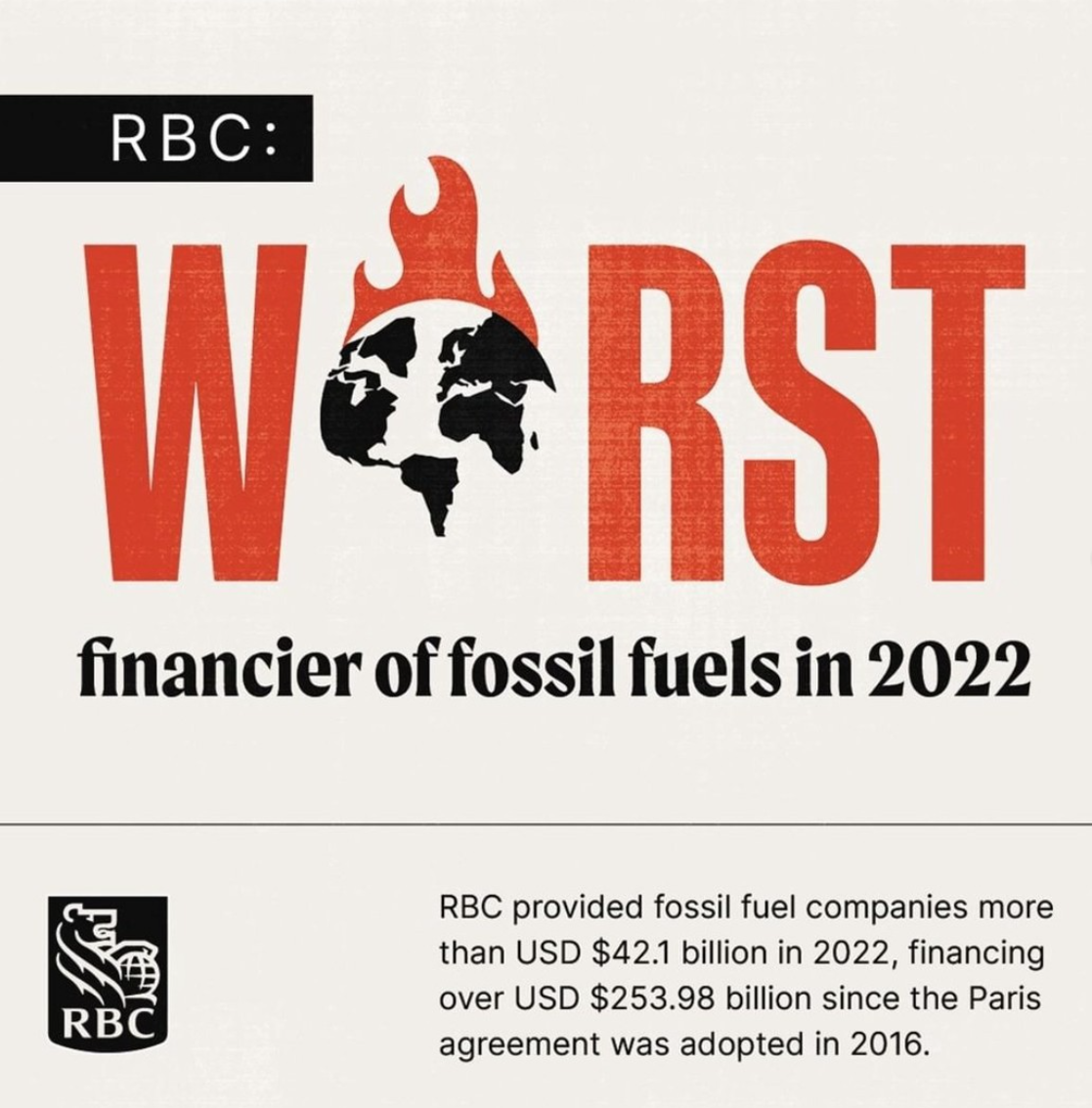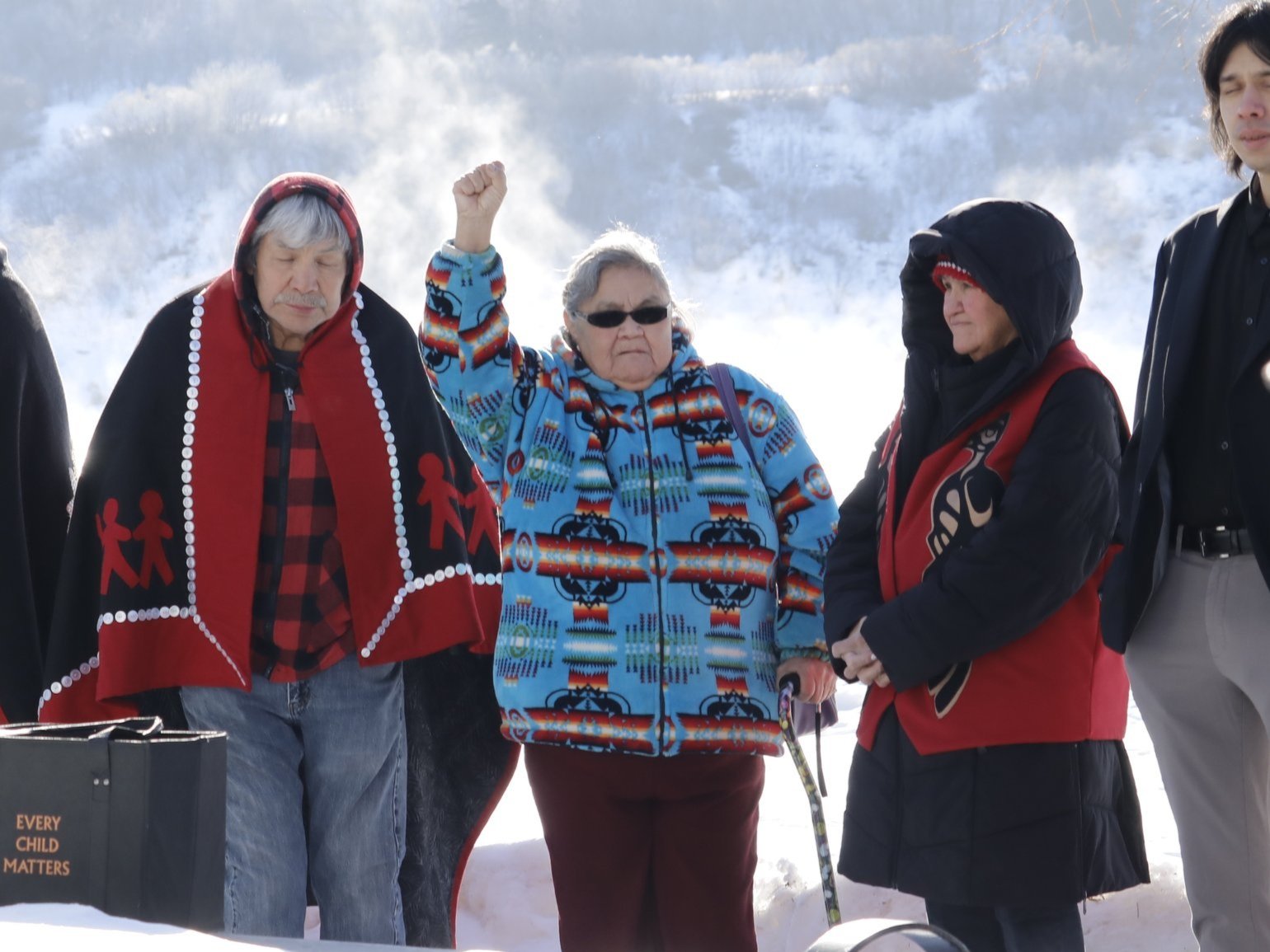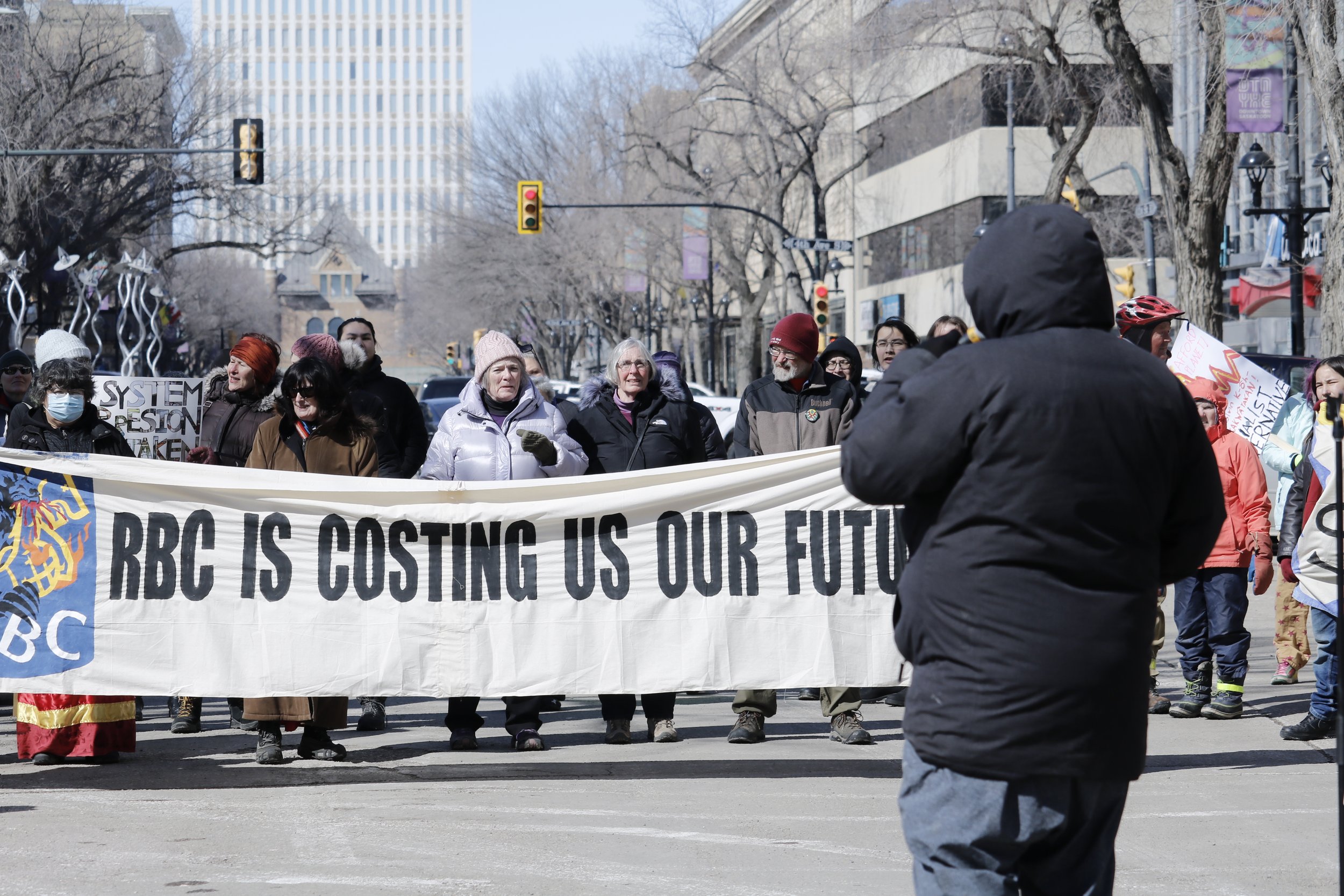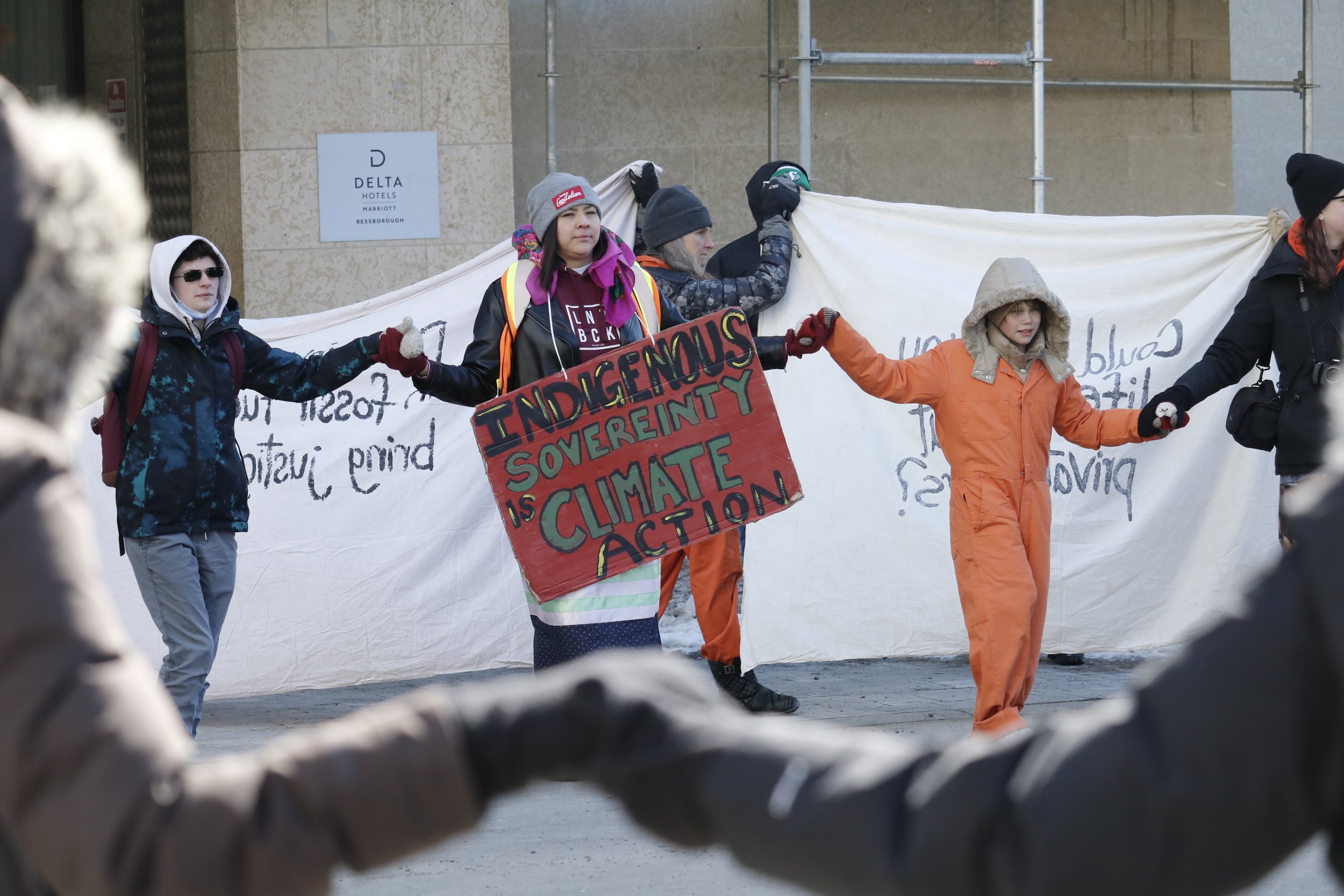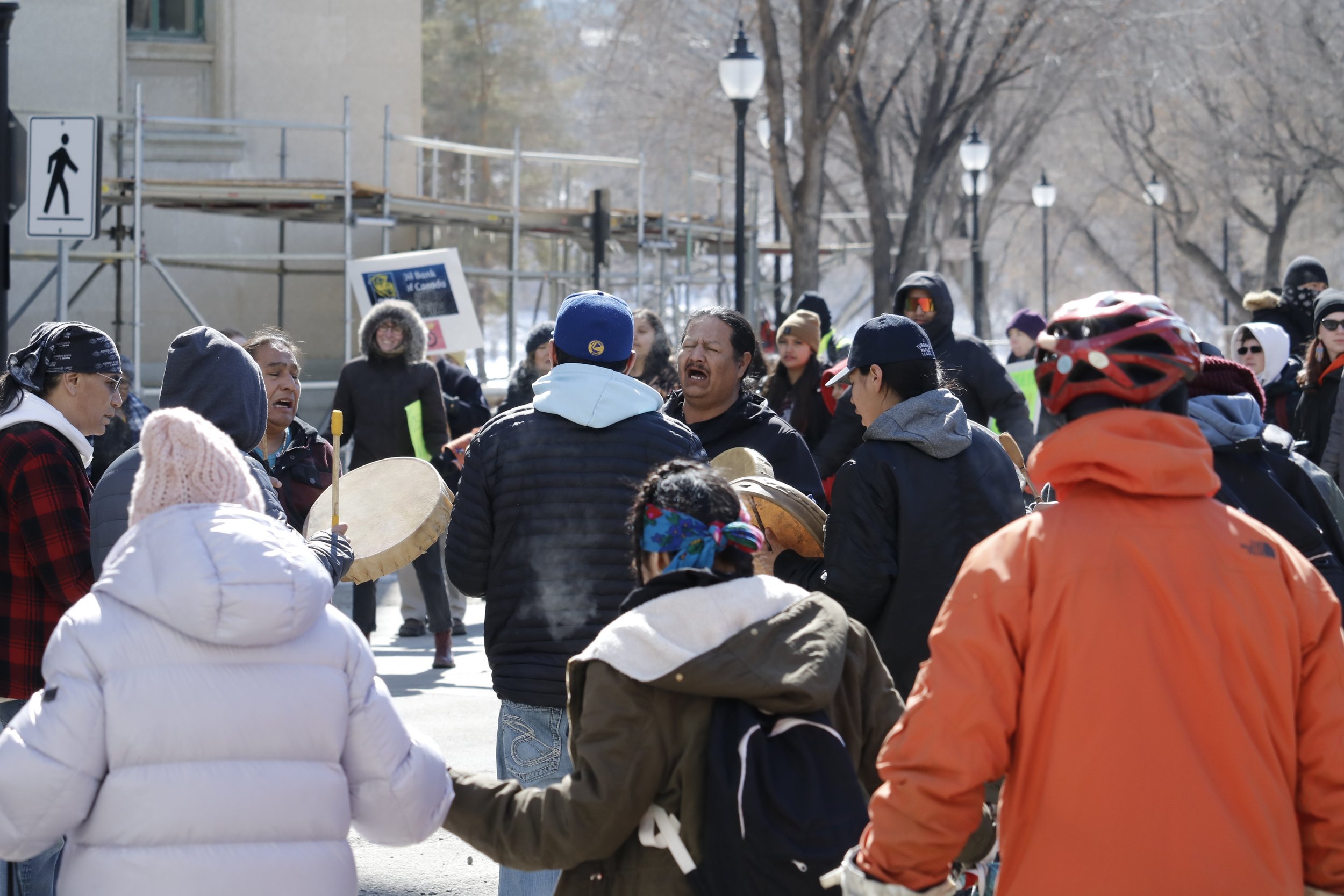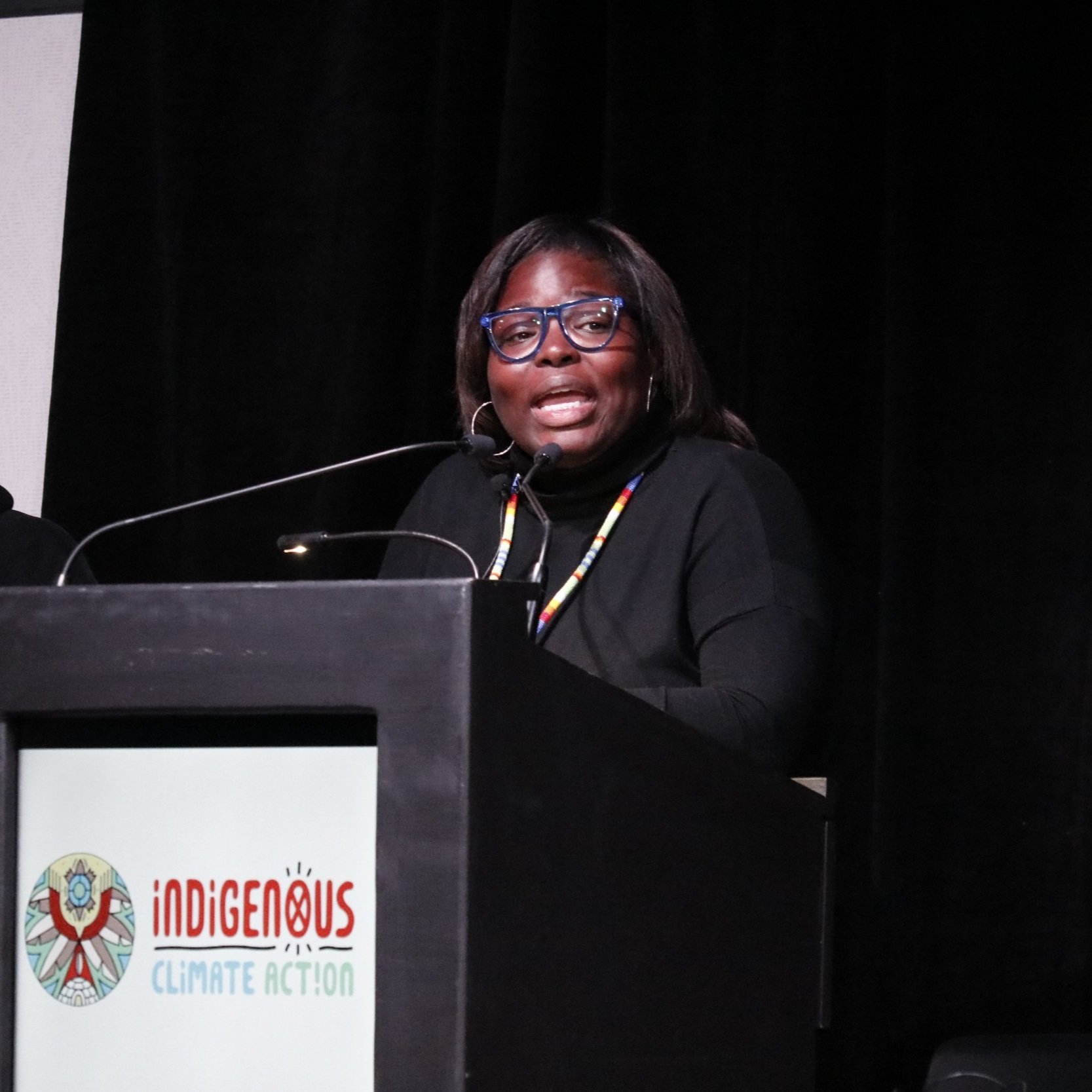Divestment Blog: Indigenous Delegation Denied Entry into 2023 Royal Bank of Canada Annual General Meeting
Who is Financing the Destruction of Our Lands?
Royal Bank of Canada (RBC) finances projects that violate the rights of Indigenous communities and harm the environment.
RBC’s Annual General Meeting (AGM) generally takes place in Toronto, Ontario, where the head office is located within the financial district. This year however, RBC announced for the first time that the meeting location changed to Saskatoon, Saskatchewan. Following the launch of the No More Dirty Banks campaign and the a major divestment mobilization at RBC's 2022 AGM, the bank announced on short notice they would be moving their 2023 meeting to Saskatoon, Saskatchewan. Through the guise of a seemingly innocent switch, this was a tactic by RBC to shamelessly evade much-warranted media attention on the bank, illustrating the lack of accountability to those with concerns regarding which companies RBC is financing.
In the past year, it has been revealed that RBC is now the largest financier of the fossil fuel industry in the world.
Healing in Ceremony
Vanessa Gray, Indigenous Climate Action’s (ICA) Divestment Campaign Coordinator, works alongside the Canadian Banking Coalition including Wet'suwet'en representatives and ENGOs like Greenpeace and STAND. With the leadership of Indigenous representatives, the Coalition supported the formation of the Indigenous delegation to attend RBCs’ 2023 AGM. Leading up to the AGM, national organizers met regularly with local Indigenous organizers to create a ceremonial space to support the Indigenous delegation during their visit. This included a pipe ceremony, lunch feast and a gifting ceremony where representatives received traditional star blankets—ending the ceremony with a round dance. A sharing circle was hosted by ICA for Indigenous participants to introduce themselves and speak about the impacts the fossil fuel industry has on their communities. Coming together before the AGM allowed Indigenous representatives to connect with each other, find grounding in our cultural practices, and hold a collective space for healing. Supporting our Indigenous communities, as well as their cultural and traditional needs, is vital when participating in colonial processes.
Indigenous Delegation Panel Discussion
Our Divestment and Communications team came together to present 'Who is Financing the Destruction of our Lands', a panel featuring Indigenous leaders and advocates who shared their experiences and analyzed RBC's financing decisions—highlighting the connection between the resulting impacts. Hereditary Chief Na’Moks, Tara Houska, Roishetta Ozane, and Jesse Cardinal provided insight into the struggle of their respective communities, calling on RBC to adopt responsible and ethical financing policies. Coming together in solidarity shows the power of collective action and community organizing. By providing support and amplifying Indigenous voices, wechallenge RBC's hostile and exclusionary behavior, and confront the bank's financing policies—that continue to fund violence against Indigenous Peoples, violations of Indigenous sovereignty, and destruction of lands and waters. Despite industry efforts, the flame of resilience and strength of Indigenous communities burns bright in the face of environmental racism. ICA's support of land defenders at RBC's AGM showcases the importance of challenging harmful practices and provides a model for sustainable, consensual, and respectful practices.
Chief Na’Moks speaking at Indigenous Delegation Panel
“This is a planet that we live on that doesn’t need us. We need this planet. What we do makes a huge difference for our children and grandchildren…Because you gotta remember: water flows and the wind blows and everything that happens on our land affects all of you.”
“It is absolutely ludicrous that BIPOC people, Black, Indigenous, people of colour, we continue to get the short end of the stick. We continue to be marginalized, we continue to be placed in a box in which we cannot breathe.”
— Roishetta Ozane, CEO & Founder of The Vessel Project of Louisiana
Roishetta Ozane speaking at Indigenous Delegation Panel
Why Annual General Meetings (AGMs) are Key Opportunities
The AGM is the perfect opportunity for shareholders and interested parties to discuss the company's finances, policies, and plans for the future. Indigenous delegates aimed to share their experiences and concerns regarding RBC's financing decisions involving projects affecting their lands and communities. One of the representatives attending the AGM included Grand Chief Stewart Phillip. Chief Phillip represents the Union of British Columbia Indian Chiefs (UBCIC), who have filed a resolution calling on RBC to implement Free, Prior, and Informed Consent (FPIC) in their financing decisions. The Wet'suwet'en Hereditary chiefs and land defenders continue to face daily police violence from the enforced construction of the opposed Coastal Gaslink Pipeline through their traditional unceded territory, and Kolin Sutherland-Wilson from the Gitxsan Territory, where Enbridge is proposing a pipeline project that impacts Lax'yip and respective Wilp governance.
We Will Not be Silenced
Vanessa Gray witnessed RBC's security personnel deny access to the meeting and push Indigenous representatives into colour coded segregation. RBC claimed the reasoning behind the denial of entry of Indigenous representatives was that they received yellow badges, whereas the meeting was supposedly restricted to people with blue badges. RBC also claimed the meeting was at full capacity and that is why Indigenous representatives only had access to the overflow room, where the meeting could be seen on a screen and a mic was set up for questions and statements. When the Indigenous delegates tried to attend the meeting, Vanessa also witnessed RBC security shove and push the Indigenous delegates, including Chief Na'Moks, by putting their hands on his regalia, intimidate an Elder named Aunty Janet, and push Eve Saint.
The Royal Bank of Canada’s volatile and exclusionary behavior reinforces the colonial power dynamics that have historically oppressed and forcibly assimilated Indigenous peoples. RBC's actions demonstrate a lack of respect for Indigenous sovereignty and rights to Free, Prior, and Informed Consent (FPIC). Moreover, it shows the disconnect between the bank's promises of sustainable and ethical practices and its actual involvement in the fossil fuel sector.
Community Action through Divestment
It is time for us to realize the Royal Bank, as well as other major banks and the fossil fuel industry, do not govern us—we govern them.
“How can we tell these banks that they’re wasting money? That these projects are not going to be complete because we did not agree to it. But we can never ever do it alone. That’s how we can tell them that, it’s with all of you standing up and setting things right.”
What can you do?
Understand who are the major banks contributing to continued environmental racism, such as Canada’s Big 5.
Consider switching banks. Banking on a Better Future has resources available that can help you find alternative banking options, as well as switch your bank from Commercial Banks (for-profit institutions owned by their shareholders) to an institution like a Credit Union (not-for-profit financial cooperatives).
Demand provincial and federal governments hold industry accountable.
More
Check out the article I Switched To A Credit Union To Help Fight Climate Change—with insights into Indigenous Divestment from Vanessa Gray.
About the Author
Vanessa Gray, Divestment Campaign Coordinator, is a queer Anishinaabe Kwe from the Aamjiwnaang First Nation. She is a water protector, environmental researcher, and community organizer for the Great Lakes region. Vanessa is a respected land defender emphasizing Indigenous peoples inherent and legal rights and sovereignty within climate justice. She continues to take part in a diversity of strategies, including calls on Concordia University to divest from fossil fuels, co-hosting Toxic Tours, and direct actions in solidarity with land defenders on Wet'suwet'en territory who continue to oppose the Coastal Gas Pipeline.
As a researcher, Vanessa is well known for her environmental justice work on pollution in Ontario’s Chemical Valley – a petrochemical hub on her territory and surrounding her community of Aamjiwnaang First Nation. She is the co-founder of Aamjiwnaang and Sarnia Against Pipelines (ASAP), Porcupine Warriors, and co-lead of the Environmental Data Justice (EDJ) Lab, which produces tools to visualize the relationship between colonialism, data, and pollution such as the Pollution Reporter App. Aamjiwnaang community member’s constant exposure to harmful emissions results in some of the highest mortality rates for cancers and respiratory diseases in Ontario. Vanessa has dedicated her life to challenging colonial violence and its impacts on environmental health.


